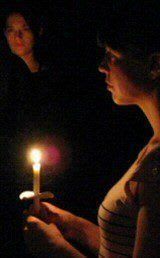Moisés Kaufman's documentary play is apparently one of the most performed pieces of theatre in America currently. Wild Oats Productions have given it a rare outing to these shores, ostensibly to mark the 11th anniversary of the death-by-beating of gay college student Matthew Shepard in Laramie, Wyoming - the event which is the play's focus. But it soon becomes clear that this is no mere ceremonial production, and no sort of period piece.
The original play was born out of Kaufman's desire to write something "about what's happening in Wyoming". He and fellow members of the Tectonic Theatre Project made six trips to Laramie, to observe the immediate aftermath of the crime and the eventual trials of its perpetrators, and to conduct over 200 interviews with the people of the town. The play is stitched together out of dozens of verbatim extracts of these testimonies. What emerges is a wide, compassionate portrait of a community in crisis. The warmth, passion and generosity of spirit of many of the interviewees is given to us open-handed. The bigotry, narrow-mindedness and toxic hatred of many others, is dropped in lightly, matter-of-factly, and it is left to us what conclusions we draw.
This is right and good - there'd be little point to a play that merely reiteratated the negative judgements we could have formed from the bare facts alone. Not that Kaufman in any way dilutes the horror of the crime. But he allows complex viewpoints to come forth.
Matthew Shepard left a bar one night in the company of two local Laramie men, in circumstances which are still debated. They drove him out to the deserted plain outside of town, and there beat him severely and left him tied to a fence, where he lay for eighteen hours before being found. He died a few days later in hospital. His death caused a national outcry against homophobic hate crime, with massive protest marches in most of the major American cities. The Wyoming state governor responded to proposals to legislate against hate crime by warning that it could "give special rights to one particular group against others". Meanwhile one straight-talking townswoman simply doesn't understand the concept - "surely if you murder someone, you hate them": unable to distinguish the special nature of an attack against a person not because of personal animosity but because of what they represent. What Matthew Shepard represents becomes a large part of the story, which the play cleverly acknowledges. The greedy media's keenness to reconfigure him as some sort of saint is also up for criticism.
But set against this is the breathtaking bigotry of some of the religious community - all the more shocking for being presented not with any flash of thunder or great dramatic flourish, but simply woven into the mesh of voices. We hear snatches of the poisonous rhetoric of Fred Phelps, who preached on the street outside Shepard's funeral - quoting all Biblical examples of condemnation of homosexuality and concluding that "God's hatred is pure". We hear the local parson expressing hope that Shepard, while he lay dying on the Laramie plain, "had time to reflect on the lifestyle which had led him to this point".
Other members of the community prove to be the ones on which hope has to be pinned. The university theatre lecturer speaks candidly about the conservative opinions of many of her students, but appreciates their honesty and directness, and would rather they had opinions than not.
The Wild Oats company excel at moving between different figures to show the great reserves of compassion among the townspeople. Jenna Berk is excellent both as the lecturer and as the police officer who was first at the crime scene and is haunted by the image of the bleeding Shepard - and who unknowingly risked contracting HIV when she tended to him. Adam Unze brings nice comic touches to the honest and fair-minded barman, a key eyewitness. And Kevin James heartbreakingly reenacts the moment when the hospital spokesman, announcing Shepard's death on national television, broke down completely.
The idea of Wyoming gays being likely to be the toughest men around and the painful irony of the beauty of the landscape against which this atrocity occurred made me think of Brokeback Mountain, another Wyoming story. Kaufman understands the specific poetry of a particular place, and allows this to come through. What Shepard went through, lying on the plain for eighteen hours, is so clearly evoked that we are out there with him for a moment: in a spot which the townspeople make clear could never lose its natural beauty, despite what happened there. Shepard's father, in his final courtroom address (a speech which is reproduced in its entirety) spoke of being grateful that his son was not alone out there but was kept company by the view of the glittering town at night, the sky, and "the scent of the pine trees from the snowy range, and ever-present Wyoming wind".
Joseph Walsh's staging has a lovely feel of communal effort to it. The company smile at each other between movements of the play; move across the stage repositioning chairs and themselves as each different testimony starts; and segue smoothly between inhabiting the different interviewees and playing the interviewers themselves, the members of the original theatre company who visited the town. They rotate roles constantly so that our ability to see clearly where the oppositions are, where the battle lines are drawn, is challenged. Everything is done with the lightest of touches, the better to persuade us that this happened not in a horror movie but in the real world; in a normal town where you might just still detect the elusive whiff of horror on the air.
Until 22nd November
